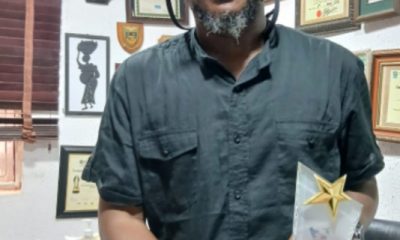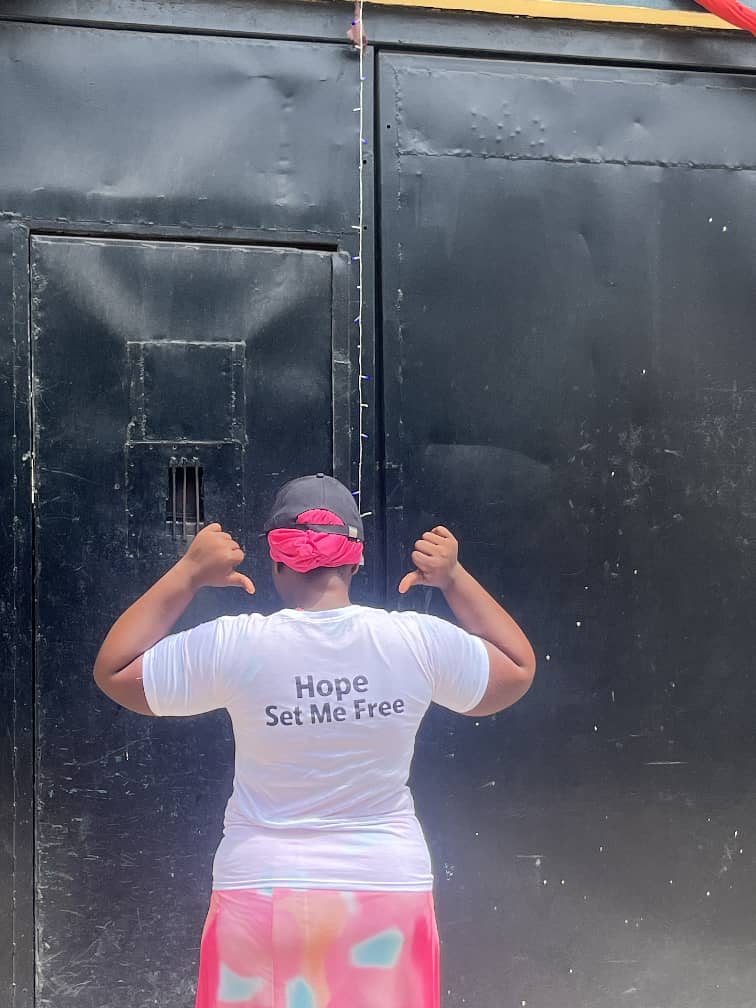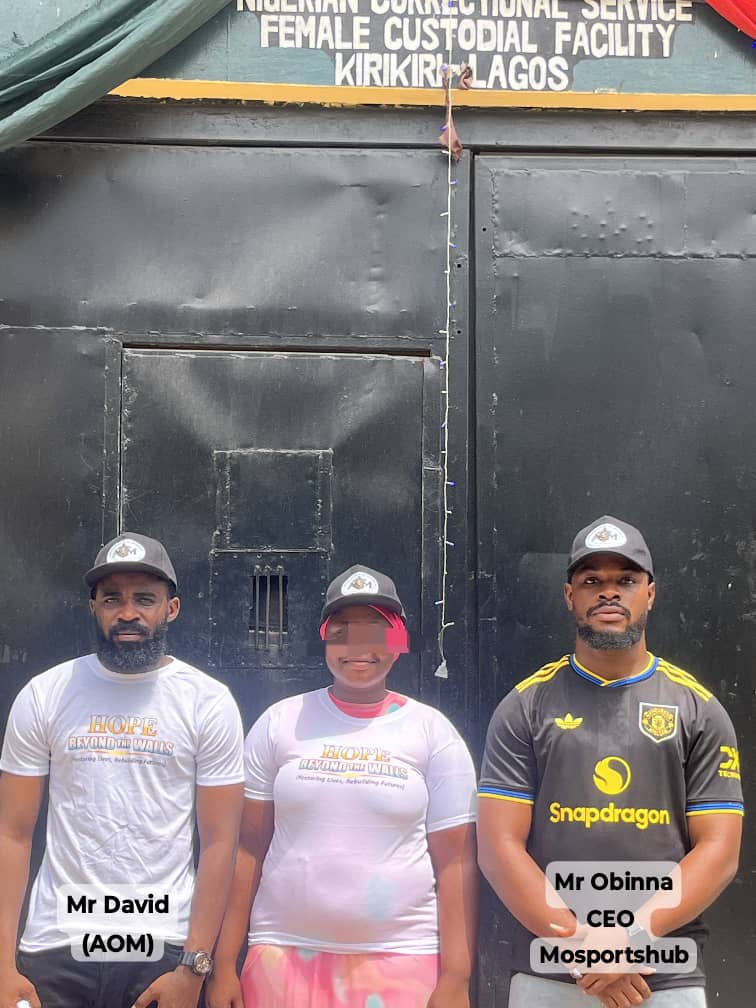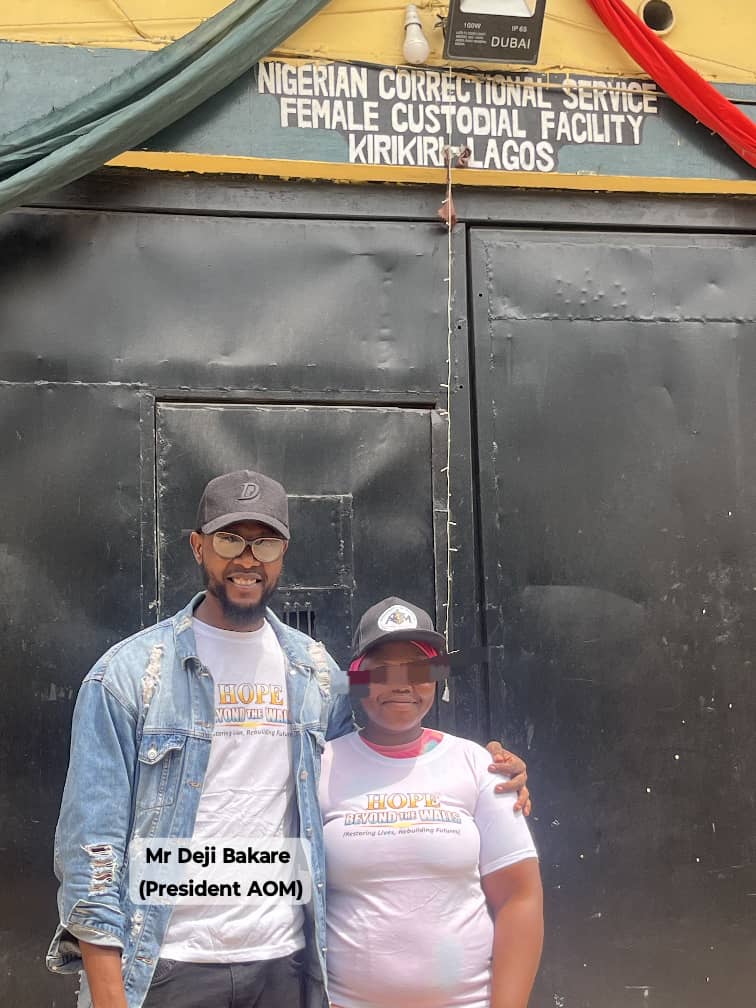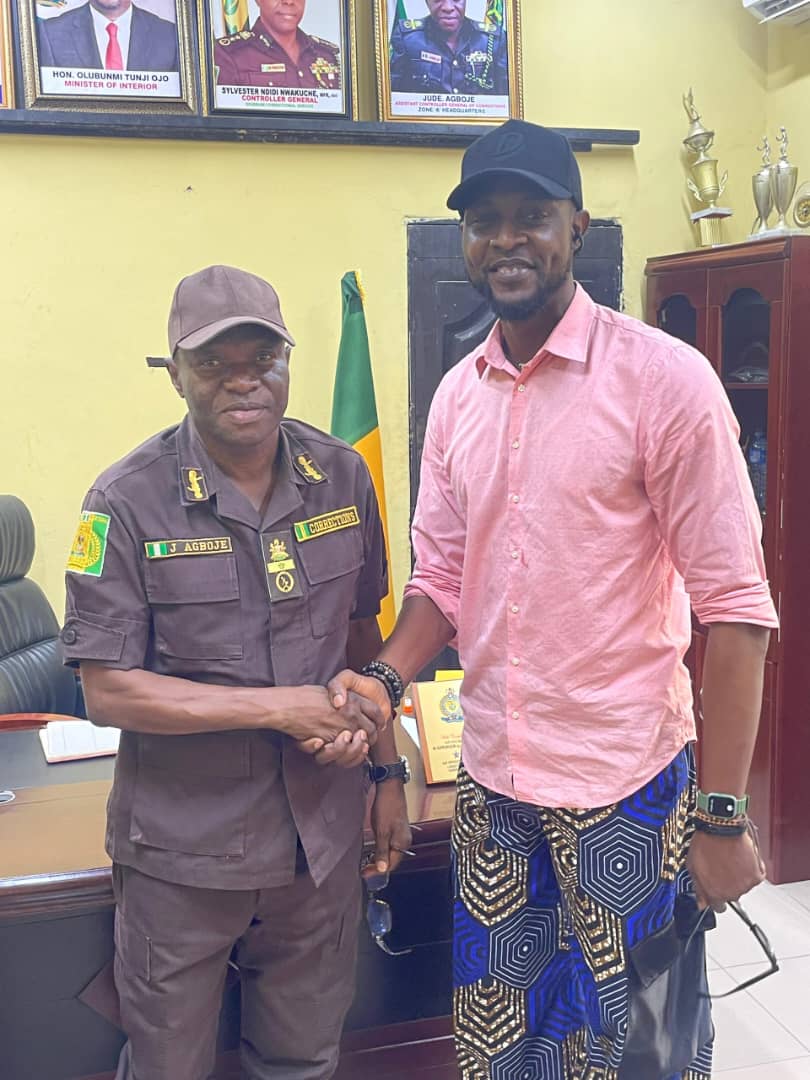society
Lady, 28, dumps my 65year-old brother at LUTH after stealing his millions – Sister

By Ifeoma Ikem
The family of a 65 year-old retired Chevron staff, Solomon Akukwe is presently fighting tooth and nail to secure the release of their son from the Lagos University Teaching Hospital, (LUTH), Idi- Araba Lagos.
Akukwe was alleged to have been abandorned at LUTH by his 28 year-old lover, Mariam Seidu who also left an instruction that the man should not be released to any family members.
According to a petition written by Ngozi Adenuga, younger sister of Solomon who suffers intermittent mental disorder, Akukwe and Seidi met at a rehabilitation center in Abuja where both received treatment, and became lovers.
The petition stated that Akukwe was at the centre to be stabilized while Seidu was there to be rehabilitated from drugs addiction.
It was learnt that as soon as Akukwe left the centre, Seidu on discovering that he was well to do, tricked him into leaving his sister’s home in Abuja whereupon they eloped to Lagos where the man has a house.
In Lagos Seidu became the Alpha and Omega of Akukwe’s life as she took over his affairs and his bank transactions, and confiscated his ATM card with which she withdraws money at will.
This was possible because the man suffers mental imbalance from time to time according to Adenuga’s petition and because his first wife and son had already left the house due to frustration.
It was realized also that another woman who Akukwe married after his first also abandoned him after siphoning huge amounts of money from his account.
Akukwe’s sister found out that Seidu’s dangerous ploys might be to manipulate him unto death in other to claim his assets, having known the family’s history, and that Akukwe has no brother or parent.
She decided to notify the police to look into the situation, especially as it is only herself and her younger sister that were the only family left that could protect Akukwe’s interests.
The petition alleged that Adenuga’s determination to save her brother from Seidu’s clutches met a brick wall as she realized that Seidu had taken her brother to LUTH, after worsening his illness by continuing to help him smoke and imbibe alcohol heavily.
Marian Seidu also left instructions with the hospital management to only relate with her.
Adenuga allegedly also found out that even some of the officials at LUTH had access to her brother’s phone, and that they too tampered with her sick brother’s funds at will.
This development made her think that there is a big conspiracy between Seidu and the health workers, perhaps to help drain Akukwe’s account till its became empty.
Part of the petition reads thus; “Sir, there is no doubt that there is a dangerous conspiracy going on, and our ultimate fear is that these parties mentioned are out to kill my brother and confiscate his assets.
” We are worried that if nothing is done quickly, their overt and covert desire will come to fruition and will lead to dangerous intra-family and social clashes “
Adenuga’s suspicions and fear heightened when Seidu blatantly disregarded the instructions of the family sent through Akukwe’s driver that her brother should not be taken to LUTH, but should be taken to either a Chevron facility or a psychiatric hospital for care.
In order to fight for her brother, Adenuga said she had abandoned her business and family in Abuja.
“In addition, the body language of the LUTH workers is scary and incomprehensible”, she said.
Adenuga said she was also shocked about what she witnessed one faithful day when she visited LUTH to see her brother Akuekwe and was bundled to the security post.
“I was disgraced without being allowed to see my brother to know his present state and even up until now, nobody, except Seidu, is allowed to visit my brother.
`How could it be that the family members of a patient would not be allowed to see their relation but an outsider can? ” she queried.
“Why must the hospital also have access to a sick man’s account when he has family, and when his lover who brought him is still around?
“Why is LUTH refusing to release or discharge Akukwe for proper care since they abandon him in a dark and lonely Hall? ” She again quizzed.
Our correspondent put a call through to Seidu as regards this development, and she sounded unperturbed and instead cautioned that no one should accuse her wrongly.
Meanwhile, when our reporter visited LUTH Akukwe was in fact in lonely confinement, and from every indication, it appeared that the hospital is waiting for instructions from Seidu for the next line of action.
Adenuga has however maintained that her brother should be released to the family so that he could be properly taken care of.
society
Viral “Chat With God” Claim Targeting Kenyan Prophet David Owuor Proven False

Viral “Chat With God” Claim Targeting Kenyan Prophet David Owuor Proven False
By George Omagbemi Sylvester, SaharaWeeklyNG
“Viral screenshot sparks national controversy as the Ministry of Repentance and Holiness dismisses fabricated “divine” WhatsApp exchange, raising urgent questions about faith, digital misinformation, and religious accountability in Kenya.”
A sensational social media claim that Kenyan evangelist Prophet Dr. David Owuor displayed a WhatsApp conversation between himself and God has been definitively debunked as misinformation, sparking national debate over digital misinformation, religious authority and faith-based claims in Kenya.
On February 18–19, 2026, an image purporting to show a WhatsApp exchange between a deity and Prophet Owuor circulated widely on Twitter, Facebook, WhatsApp groups and TikTok. The screenshot, allegedly shared during one of his sermons, was interpreted by many as illustrating unprecedented direct communication with the divine delivered through a mainstream messaging platform; a claim that, if true, would have broken new ground in how religious revelation is understood in contemporary society.
However, this narrative quickly unraveled. Owuor’s Ministry of Repentance and Holiness issued an unequivocal public statement calling the image “fabricated, baseless and malicious,” emphasizing that he has never communicated with God through WhatsApp and has not displayed any such digital conversation to congregants. The ministry urged the public and believers to disregard and stop sharing the image.
Independent analysis of the screenshot further undermined its credibility: timestamps in the image were internally inconsistent and the so-called exchange contained chronological impossibilities; clear indicators of digital fabrication rather than an authentic conversation.
This hoax coincides with rising scrutiny of Owuor’s ministry. Earlier in February 2026, national broadcaster TV47 aired an investigative report titled “Divine or Deceptive”, which examined alleged “miracle healing” claims associated with Owuor’s crusades, including assertions of curing HIV and other chronic illnesses. Portions of that investigation suggested some medical documentation linked to followers’ health outcomes were fraudulent or misleading, intensifying debate over the intersection of faith and public health.
Credible faith leaders have weighed in on the broader context. Elias Otieno, chairperson of the National Council of Churches of Kenya (NCCK), recently urged that “no religious leader should replace God or undermine medicine,” affirming a widely accepted Christian understanding that divine healing does not supplant established medical practice. He warned against unverified miracle claims that may endanger lives if believers forego medical treatment.
Renowned communications scholar Professor Pippa Norris has noted that in digital societies, “religious authority is increasingly contested in the public sphere,” and misinformation (intentional or accidental) can quickly erode trust in both religious and secular institutions. Such dynamics underscore the importance of rigorous fact-checking and responsible communication, especially when claims intersect profoundly with personal belief and public well-being.
In sum, the viral WhatsApp chat narrative was not a revelation from the divine but a striking example of how misinformation can exploit reverence for religious figures. Owuor’s swift repudiation of the false claim and broader commentary from established church bodies, underline the ongoing challenge of balancing deeply personal faith experiences with the evidence-based scrutiny necessary in a digitally connected world.
society
HOPE BEYOND THE WALLS 2026: ASSOCIATION OF MODELS SUCCESSFULLY SECURES RELEASE OF AN INMATE, CALLS FOR CONTINUED SUPPORT

HOPE BEYOND THE WALLS 2026: ASSOCIATION OF MODELS SUCCESSFULLY SECURES RELEASE OF AN INMATE, CALLS FOR CONTINUED SUPPORT
The Association of Models (AOMNGO) proudly announces the successful completion of the first edition of Hope Beyond the Walls 2026, a humanitarian initiative dedicated to restoring hope and freedom to deserving inmates.
Despite enormous challenges, financial pressure, emotional strain, and operational stress, the organization remained committed to its mission. Through perseverance, faith, and collective support, one inmate has successfully regained freedom a powerful reminder that hope is stronger than circumstance.
This milestone did not come easily.
Behind the scenes were weeks of coordination, advocacy, fundraising, documentation, and intense engagement. There were moments of uncertainty, but the determination to give someone a second chance kept the vision alive.
Today, the Association of Models gives heartfelt appreciation to all partners and sponsors, both locally and internationally, who stood with us mentally, financially, morally, and physically.
Special Recognition and Appreciation To:
Correctional Service Zonal Headquarters Zone A Ikoyi
Esan Dele
Ololade Bakare
Ify
Kweme
Taiwo & Kehinde Solagbade
Segun
Mr David Olayiwola
Mr David Alabi
PPF Zion International
OlasGlam International
Razor
Mr Obinna
Mr Dele Bakare (VOB International)
Tawio Bakare
Kehinde Bakare
Hannah Bakare
Mrs Doyin Adeyemi
Shade Daniel
Mr Seyi United States
Toxan Global Enterprises Prison
Adeleke Otejo
Favour
Yetty Mama
Loko Tobi Jeannette
MOSES OLUWATOSIN OKIKIADE
Moses Okikiade
(Provenience Enterprise)
We also acknowledge the numerous businesses and private supporters whose names may not be individually mentioned but whose contributions were instrumental in achieving this success.
Your generosity made freedom possible.
A CALL TO ACTION
Hope Beyond the Walls is not a one-time event. It is a movement.
There are still many deserving inmates waiting for a second chance individuals who simply need financial assistance, legal support, and advocacy to reunite with their families and rebuild their lives.
The Association of Models is therefore calling on:
Corporate organizations
Local and international sponsors
Philanthropists
Faith-based organizations
Community leaders
Individuals with a heart for impact
to partner with us.
Our vision is clear:
To secure the release of inmates regularly monthly, quarterly, or during special intervention periods through structured support and transparent collaboration.
HOW TO SUPPORT
Interested partners and supporters can reach out via
Social Media: Official Handles Hope In Motion
Donations and sponsorship inquiries are welcome.
Together, we can turn difficult stories into testimonies of restoration.
ABOUT AOMNGO
The Association of Models (AOMNGO) is a humanitarian driven organization committed to advocacy, empowerment, and social impact. Through projects like Hope Beyond the Walls, the organization works tirelessly to restore dignity and create opportunities for individuals seeking a second chance.
“When we come together, walls fall and hope rises.”
For media interviews, partnerships, and sponsorship discussions, please contact the Association of Models directly.
society
SENATOR ADEOLA YAYI REGISTERS 4000 JAMB CANDIDATES
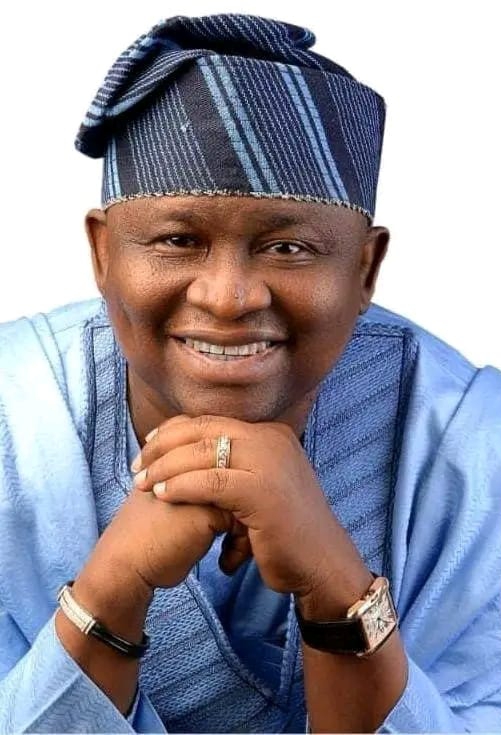
SENATOR ADEOLA YAYI REGISTERS 4000 JAMB CANDIDATES
In continuation of his educational support initiatives and following established tradition, Senator Solomon Adeola (APC,Ogun West) has successfully paid for and enrolled 4000 indigent students for the 2026 Joint Admission Matriculation Board(JAMB) examination.
According to a release e-signed and made available to members of the League of Yewa-Awori Media Practitioners (LOYAMP) by High Chief Kayode Odunaro, Media Adviser to Senator Adeola and shared with (your mediu), the programme financed by the senator under the “SEN YAYI FREE JAMB 2026” ended on Saturday , February 21, 2026, with a total of 4000 candidates successfully enrolled with their PINs provided.
Commenting on the success of the programme, Senator Adeola said the programme is another leg of his personal educational empowerment for indigent but brilliant citizens preparatory to his scholarship and bursary facilitation for tertiary education institutions’ students.
“As far as I can help it, none of our children will miss educational opportunities arising out of adverse economic predicament of their parents or guardians”, he stated.
Successful candidates cut across all the three senatorial districts of Ogun State with 2183 coming from Ogun West, 1358 coming from Ogun Central and 418 from Ogun East.
Some of the candidates that applied and are yet to get their PINs due wrong information supplied in their profiles and being underage as discovered by JAMB and other reasons are being further assisted to see the possibility of getting their PINs.
The Free JAMB programme of the Senator that has been running for years is well received by appreciative beneficiaries and their parents.
Alhaji Suara Adeyemi from Ipokia Local Government whose daughter successfully got her PIN in the programme said the Senator’s gesture was a welcome financial relief for his family at this period after payment of numerous school fees of other siblings of the beneficiary seeking admission to higher institution.
Also posting on the social media handle of the Senator, a beneficiary Mr. Henry Olaitan, from Odeda LGA said that he would have missed doing the entry examination as his guardian cannot afford the fees for himself and two of his children.
-

 celebrity radar - gossips6 months ago
celebrity radar - gossips6 months agoWhy Babangida’s Hilltop Home Became Nigeria’s Political “Mecca”
-

 society6 months ago
society6 months agoPower is a Loan, Not a Possession: The Sacred Duty of Planting People
-

 society5 months ago
society5 months agoReligion: Africa’s Oldest Weapon of Enslavement and the Forgotten Truth
-

 news6 months ago
news6 months agoTHE APPOINTMENT OF WASIU AYINDE BY THE FEDERAL GOVERNMENT AS AN AMBASSADOR SOUNDS EMBARRASSING






